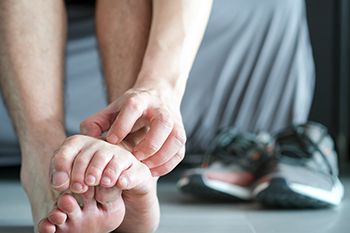

Athlete’s foot is a pesky affliction of the foot that you may experience at some point in your life. The condition is a kind of fungal infection that is spread in warm, moist environments. Most typically, athlete’s foot can be spread to someone when they walk barefoot in highly-trafficked public areas where the fungus is present such as pool sides and locker rooms. There are several risk factors associated with athlete’s foot. First, if you are someone who usually wears damp or tight-fitting shoes, socks, or stockings, then you are increasing your risk of developing athlete’s foot. Wearing this kind of shoe or sock for prolonged periods can essentially trap the fungus, enabling it to thrive and wreak havoc on your feet. Additionally, if you are someone who suffers from persistently sweaty feet, then you may be at a greater risk of developing athlete’s foot. Those with conditions such as HIV-AIDS who have impaired immune systems are also particularly susceptible to suffering from athlete’s foot, as such individuals have a difficult time fighting off the fungus. If you identify with any of these risk factor groups, it might be a good idea to contact a podiatrist who can help ward off athlete’s foot.
Athlete’s foot is an inconvenient condition that can be easily reduced with the proper treatment. If you have any concerns about your feet and ankles, contact Dr. Stephan J. LaPointe from Georgia Foot & Ankle Specialists . Our doctor will treat your foot and ankle needs.
Athlete’s Foot: The Sole Story
Athlete's foot, also known as tinea pedis, can be an extremely contagious foot infection. It is commonly contracted in public changing areas and bathrooms, dormitory style living quarters, around locker rooms and public swimming pools, or anywhere your feet often come into contact with other people.
Solutions to Combat Athlete’s Foot
Athlete’s foot can cause many irritating symptoms such as dry and flaking skin, itching, and redness. Some more severe symptoms can include bleeding and cracked skin, intense itching and burning, and even pain when walking. In the worst cases, Athlete’s foot can cause blistering as well. Speak to your podiatrist for a better understanding of the different causes of Athlete’s foot, as well as help in determining which treatment options are best for you.
If you have any questions please feel free to contact our office located in Rome, GA . We offer the newest diagnostic and treatment technologies for all your foot and ankle needs.